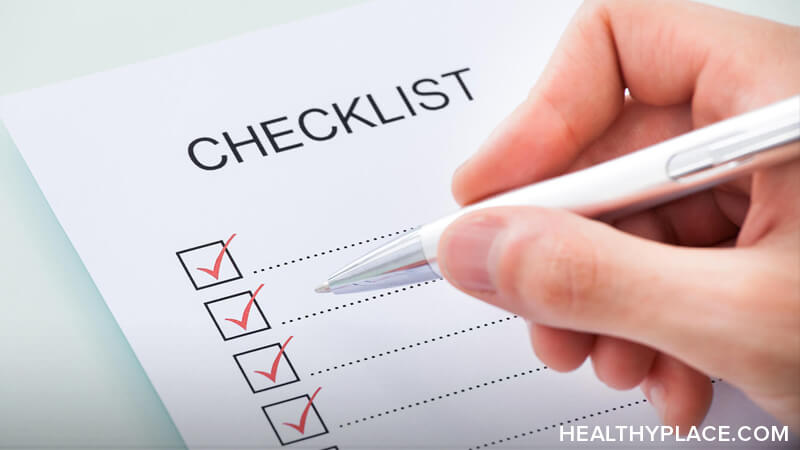Control Anxiety Attacks and Panic Attacks Using This Checklist

You probably want to control anxiety attacks and panic attacks because they are frightening experiences that make anyone who has them feel out of control. Of course people feel out of control with anxiety attacks. They are all-consuming. It’s as if the world shrinks around us like cling wrap -- squeezing, crushing, and suffocating us. And at the very same time, panic attacks make the world feel like it’s growing bigger and bigger so that there’s nothing to ground us, leaving us to spiral dizzyingly out of control. Is it even possible to control this terrible aspect of anxiety? Happily, there is. This checklist can be your guide to control anxiety attacks or panic attacks.
The terms “anxiety attack” and “panic attack” are often used interchangeably. That’s okay because there are so many similarities between them, but there is a technical difference. Anxiety attacks happen as an effect of anxiety, worry, and fear. Panic attacks, in contrast, are part of panic disorder and are connected to the fear of having more panic attacks, especially in public.
Both anxiety attacks and panic attacks are effects of anxiety and their symptoms are the same. They both involve an intense physical reaction to external events, internal thoughts and feelings about the events, or both. Even if they seem to control you now, you can turn the tables and control anxiety and panic attacks.
A Checklist to Control Anxiety Attacks, Panic Attacks
Almost everyone who experiences anxiety and panic attacks feels overwhelmed by them. It can feel like everything is going haywire, all at once, in equal intensity. Being able to pick apart the attack and how it’s affecting you is extremely valuable.
As soon as you are able, close your eyes, breathe deeply, and turn your attention inward. This checklist is designed to help you take a step back and tune into your true self rather than stuck in the anxiety.
□ What are my symptoms? Do a body scan. From head to toe, what sensations do you notice?
□ What am I thinking? Don’t try to change your thoughts and don’t judge them, just take note.
□ What are my emotions? Again, just take note.
□ What’s my stress level? Are there any new or unusual stressors, any recurring stress?
□ What have I been doing lately?
□ What haven’t I been doing? Ask yourself, "Am I exercising less? Getting less sleep? Not havin enough fun?"
□ How have I been reacting to people and events in my life?
Contol You Attack by Putting Your Anxiety Attack, Panic Attack Checklist to Work
Answering the questions in the checklist—in writing if it’s possible—helps you separate yourself from the panic attacks. It can significantly reduce the intensity of the anxiety in the moment.
Next, you can put your answers to work for you. You have the knowledge, which is an important first step. What will help you control anxiety attacks and panic attacks is turning your knowledge into action. For each question in the checklist, do/answer the following:
□ Rate how much each item is bothering you on a scale from 1 to 10, with 1 representing not at all and 10 representing very much.
□ Choose one or two of the most bothersome items. Trying to work on everything at once is anxiety-provoking in itself, but choosing one or two to reduce can be successful.
□ What do you want in your life instead of these symptoms?
□ What will your life be like with the problematic symptoms and effects of anxiety attacks are gone?
□ What small actions can you do, what choices can you make, to get there step by step?
By sorting out what you’re experiencing, you can act to control anxiety attacks and panic attacks.
APA Reference
Peterson, T.
(2018, March 8). Control Anxiety Attacks and Panic Attacks Using This Checklist, HealthyPlace. Retrieved
on 2026, March 4 from https://www.healthyplace.com/blogs/anxiety-schmanxiety/2018/03/your-checklist-to-control-anxiety-attacks-panic-attacks
Author: Tanya J. Peterson, MS, NCC, DAIS
This checklist has really helped me cope with anxiety and panic attacks. Writing everything out and figuring out my symptoms has really calmed me down and has helped me realize what I need to do to help myself.
Thank you Tanya for sharing your knowledge. Best wishes?
Thank YOU, Rene. Best wishes back at you.